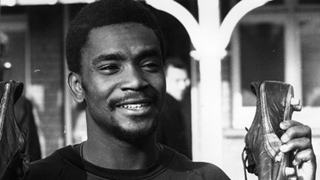
On the morning of 15 July 1989 Laurence Paul Cunningham passed away and the world of football lost an icon. 26 years on we look back at the defining impact he made on the game.
Born in Archway in March 1956, Cunningham’s career began at Leyton Orient, for whom he signed in 1974.
He remained in east London for three years but would go on to appear on the global stage for his country, as well as two of the world's biggest clubs.
However, Cunningham's life was cut short in tragic circumstances 15 years after signing his first contract at Orient.
But such was the impact he had within the game, his memory lives on.
From London to Leicester, Manchester to Madrid, Cunningham created iconic memories and tackled the prejudice he faced without fear.
He played football when racism on the terraces was rife.
In the face of unprecedented provocation and abhorrent abuse, the man described by his friend and former team-mate Cyrille Regis as an “inspiration” would go on to lift The FA Cup, become the first British player to represent Real Madrid – and the first black player to play for England at Under-21s level.
And according to Regis his influence and ability will never be forgotten.
Regis – who played with Cunningham at West Bromwich Albion for two years between 1977 and 1979 – spoke of the impact he had on the world of football.
“I first saw Laurie play as a 14 or 15 year-old at Leyton Orient," said Regis.
"I remember turning to Clyde Best and saying 'this lad is going to be a good footballer'. I was wrong – he turned out to be a great footballer.
“Off the pitch he was a bit of an introvert – but on it he was an extrovert. He played without fear and was a tremendous talent.
"Laurie Cunningham's legacy can be described in one word. Inspirational.”
It was his time at Real Madrid – for whom he signed in 1979 and remained for five years – that many remember.
His role in the historic Crazy Gang of Wimbledon and their march to FA Cup glory in 1988 that will also live long in the memory.
But it was during his spell at West Brom that, arguably, he made his most significant contribution.
He joined the Baggies in 1977 where he teamed up with Regis. A year later another black player, Brendon Batson, also signed for Ron Atkinson’s outfit, and the trio became known as ‘The Three Degrees’ after the legendary US soul singers.
But behind the jovial nickname Cunningham, Regis and Batson were part of something far more important.
“The mark he left on the game will last forever. You'll be forever 33, Laurie.”
Cyrille Regis
At the time, only Spurs and West Ham had previously fielded three black players in the starting 11.
The trio set about changing attitudes to race, leading by example on the pitch and never shirking in the face of often unbearable adversity.
Cunningham returned to Spain in 1988 to play for Rayo Vallecano. A year later, while in Madrid, he was involved in a fatal car crash.
By then his legacy was already secure and, as Regis confirmed, his was a life and career that will never be forgotten.
“He was one of the greatest players of his generation. A pioneer for black and minority ethnic footballers and a man I am proud to say I knew.
“We miss him. But the mark he left on the game will last forever. A truly wonderful player. You’ll be forever 33, Laurie.”








